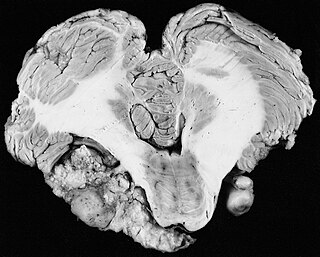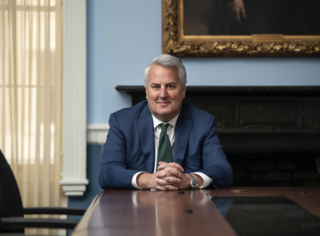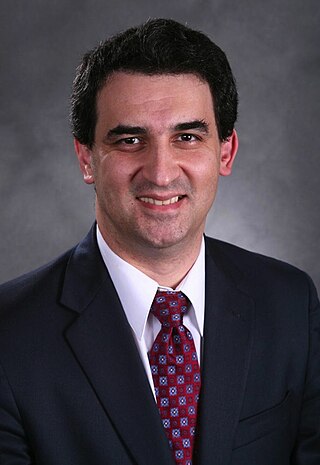
Neurosurgery or neurological surgery, known in common parlance as brain surgery, is the medical specialty concerned with the surgical treatment of disorders which affect any portion of the nervous system including the brain, spinal cord and peripheral nervous system.

A vestibular schwannoma (VS), also called acoustic neuroma, is a benign tumor that develops on the vestibulocochlear nerve that passes from the inner ear to the brain. The tumor originates when Schwann cells that form the insulating myelin sheath on the nerve malfunction. Normally, Schwann cells function beneficially to protect the nerves which transmit balance and sound information to the brain. However, sometimes a mutation in the tumor suppressor gene, NF2, located on chromosome 22, results in abnormal production of the cell protein named Merlin, and Schwann cells multiply to form a tumor. The tumor originates mostly on the vestibular division of the nerve rather than the cochlear division, but hearing as well as balance will be affected as the tumor enlarges.
Lars Leksell (1907–1986) was a Swedish physician and Professor of Neurosurgery at the Karolinska Institute in Stockholm, Sweden. He was the inventor of radiosurgery.

Radiosurgery is surgery using radiation, that is, the destruction of precisely selected areas of tissue using ionizing radiation rather than excision with a blade. Like other forms of radiation therapy, it is usually used to treat cancer. Radiosurgery was originally defined by the Swedish neurosurgeon Lars Leksell as "a single high dose fraction of radiation, stereotactically directed to an intracranial region of interest".

Stereotactic surgery is a minimally invasive form of surgical intervention that makes use of a three-dimensional coordinate system to locate small targets inside the body and to perform on them some action such as ablation, biopsy, lesion, injection, stimulation, implantation, radiosurgery (SRS), etc.
Bronson Methodist Hospital is a 434-bed non-profit teaching hospital located in downtown Kalamazoo, Michigan, United States, and is a Level I trauma center. Bronson Methodist Hospital is the flagship of the Bronson Healthcare Group, a non-profit healthcare system serving all of southwest Michigan and northern Indiana. Bronson Methodist Hospital provides care in cardiology, orthopedics, surgery, emergency medicine, neurology, oncology; in neurological care as a Comprehensive Stroke Center; in cardiac care as a Chest Pain Center; in obstetrics as a BirthPlace and high-risk pregnancy center, and in pediatrics as a children's hospital.
Elekta is a global Swedish company that develops and produces radiation therapy and radiosurgery-related equipment and clinical management for the treatment of cancer and brain disorders. Elekta has a global presence in more than 120 countries, with over 40 offices around the world and about 4,700 employees.
Mayo Hospital is one of the oldest and biggest hospitals in Lahore, Punjab, Pakistan. King Edward Medical University, one of the oldest and most prestigious medical institutions in South Asia, is attached to Mayo Hospital. Mayo Hospital is located in the heart of Old Lahore, and provides free treatment to almost all admitted patients as part of a government policy. It also has many different ward's mainly centered around the Syed A route location.

The CyberKnife System is a radiation therapy device manufactured by Accuray Incorporated. The CyberKnife System is the only radiation delivery system in the world that features a linear accelerator (linac) directly mounted on a robot to deliver high-energy x-rays or photons used in radiation therapy and combines real-time artificial intelligence (AI)-driven target tracking and treatment delivery. The platform is designed to deliver precise stereotactic radiosurgery (SRS) and stereotactic body radiation therapy (SBRT) for the treatment of benign tumors, malignant tumors, neurologic disorders and other medical conditions.
The University of Miami Division of Surgical Neurooncology is the neurological surgery center at the University of Miami's Leonard M. Miller School of Medicine and one of the largest and most comprehensive programs for brain tumor treatment in the United States. It is located in Miami.
Howard Landy is a professor of neurosurgery in the Department of Neurological Surgery and Radiation Oncology at the University of Miami and serves as the director of quality and patient safety at Jackson Memorial Hospital.
The Mischer Neuroscience Institute is a combined research and education effort between the Vivian L. Smith Department of Neurosurgery and the Department of Neurology at McGovern Medical School at UTHealth Houston and Memorial Hermann Hospital. Located in Houston, the Institute draws patients from around the world for specialized treatment of diseases of the brain and spine. It was the first center in Texas and one of only a few institutions in the country to fully integrate neurology, neurosurgery, neuroradiology, neuro-oncology, spine surgery, pain medicine and neurorehabilitation.
Professor Minesh P. Mehta, MD, FASTRO, is an American radiation oncologist and physician-scientist of Indian origin, Ugandan birth, Zambian Schooling and American Training, who contributed to the field of oncology for more than two and half decades.

Michael L. J. Apuzzo is an American academic neurological surgeon, the Edwin M. Todd/Trent H. Wells, Jr. Professor Emeritus of Neurological Surgery and Radiation Oncology, Biology, and Physics at the Keck School of Medicine, of the University of Southern California. He is also editor emeritus of the peer-reviewed journals World Neurosurgery and Neurosurgery. He is distinguished adjunct professor of neurosurgery at the Yale School of Medicine, distinguished professor of advanced neurosurgery and neuroscience and senior advisor, at the Neurological Institute, Wexner Medical School, The Ohio State University, and adjunct professor of neurosurgery, Weill Cornell Medicine, Department of Neurological Surgery & Weill Cornell Brain and Spine Center.
James R. Doty, M.D., FACS, FICS, FAANS is a clinical professor of neurosurgery at Stanford University and founder and director of the Center for Compassion and Altruism Research and Education, an affiliate of the Stanford Neurosciences Institute. He is the author of a self-help book called Into the Magic Shop: A Neurosurgeon's Quest to Discover the Mysteries of the Brain and the Secrets of the Heart. Doty is also the Senior Editor of the Oxford Handbook of Compassion Science (2017).
Docrates Cancer Center is the first and currently the only private hospital in the Nordic countries that comprehensively specialises in cancer treatment. It operates in Helsinki, Finland. It characterises its operations as those complementing the public sector. Docrates Oy was established in 2006 and the hospital started its operations at the premises of Eira Hospital in autumn 2007. It moved to its own premises in Jätkäsaari, Helsinki, in 2009, where it has hospital rights. There is a ward and Health and Recovery Center located at Docrates Cancer Center. Among other things, diagnostics, pharmacotherapy, radiation therapy and isotopic treatments are carried out at the hospital. Cancer surgeries are performed in partner hospitals. Docrates also participates in clinical trials and the testing and development of new treatments.

Northern Westchester Hospital (NWH), now known as Northwell Health, is a not-for-profit, 245-bed, all-private-room facility in Mount Kisco, New York. Founded in 1916, it serves residents of Northern Westchester, Putnam County and southern Dutchess County, as well as parts of Fairfield County, Connecticut.

Jay Steven Loeffler is an American physician at Massachusetts General Hospital where he has served as Chair of the Department of Radiation Oncology since 2000. He is the Herman and Joan Suit Professor of Radiation Oncology and Professor of Neurosurgery at Harvard Medical School.
Günther C. Feigl is an Austrian neurosurgeon. Feigl is an internationally renowned expert in minimally invasive neurosurgery. His main areas of expertise are skull base surgery and neurooncology. He specializes in the surgery of gliomas, minimally invasive endoscopy-assisted microvascular decompression in trigeminal neuralgia and facial hemispasm as well as the surgery of acoustic neuromas, tumors of the pineal gland and meningiomas of the skull base. Furthermore, his specialties comprise treatment of pituitary adenomas, spinal cord tumours and metastases as well as the area of pediatric neurosurgery.

Konstantin Slavin is a Professor and Head of the Department of Stereotactic and functional neurosurgery at the University of Illinois College of Medicine. He is a former president of the American Society for Stereotactic and functional neurosurgery and current vice-president of the World Society for Stereotactic and Functional Neurosurgery. His specialties include Aneurysm, Brain surgery, Brain Tumor, Cerebrovascular Disorders, Craniotomy, Dystonia, Essential Tremor, Facial Nerve Pain, Facial Pain, Glioblastoma, Headache disorders, Laminectomy, Lower back pain, Movement Disorders, Multiple Sclerosis, Neck Pain, Neurosurgery, Neurosurgical Procedures, Pain, Parkinson Disease, Spinal Cord Injuries, and Stroke.










